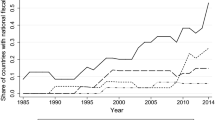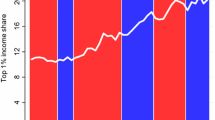Abstract
Taxation varies widely among democracies. Yet scholars disagree whether differences in political institutions help produce the variation. This article identifies topdown and bottom-up mechanisms by which political institutions are thought to influence taxation. It then combines political and economic data on more than 50 democracies to evaluate the impact of political institutions on government revenues. Cross-sectional and pooled time series analyses that include controls for economic conditions and partisan ideologies of governments confirm an indirect impact of these institutions: there is a curvilinear relationship between the size of political parties in a democracy and the tax revenues collected. Yet the effect of party size on policy outcomes is limited to a subset of democracies. The article opens new paths for research on the roles of electoral, constitutional, legislative, and party institutions in democratic policy making around the world.
Similar content being viewed by others
References
Achen, Christopher H. 2000. “Why Lagged Dependent Variables Can Suppress the Explanatory Power of Other Independent Variables.” Paper prepared for the Annual Meeting of the Political Methodology Section of the American Political Science Association, UCLA, July 20–22. Available from the author:achen@umich.edu.
Alesina, Alberto and Romain Wacziarg. 1997. “Openness, Country Size and the Government.” NBER Working Paper no. 6024. Cambridge, MA: National Bureau of Economic Research.
Alesina, Alberto, Ricardo Hausmann, Rudolf Hommes, and Ernesto Stein. 1996. “Budget Institutions and Fiscal Performance in Latin America.” NBER Working Paper no. 5586. Cambridge, MA: National Bureau of Economic Research.
Alvarez, Mike and José Antonio Cheibub, Fernando Limongi, and Adam Przeworski. 1999.ACLP Political and Economic Database andACLP Political and Economic Database Codebook (May). Available from the authors.
—. (1996). “Classifying Political Regimes.”Studies in Comparative International Development 31(2): 3–36.
Banks, Arthur S. 1996.Cross-National Time-Series Data Archive. Electronic file. Binghamton, NY: Center for Social Analysis, State University of New York at Binghamton.
Beck, Nathaniel and Jonathan Katz. 1995. “What To Do (And Not To Do) With Time-Series Cross-Section Data.”American Political Science Review 89(3): 634–47.
Boix, Carles. 2001. “Democrary, Development and the Public Sector.”American Journal of Political Science 45(1): 1–17.
Brownlee, W. Elliot. 1996.Federal Taxation in America: A Short History. Washington, D.C.: Woodrow Wilson Center Press.
Cameron, David R. 1984. “Social Democracy, Corporatism, Labour Quiescence and the Representation of Economic Interest in Advanced Capitalist Society.” Pp. 143–78 inOrder and Conflict in Contemporary Capitalism, ed. John H. Goldthorpe. Oxford: Oxford University Press.
Cheibub, José Antonio. 1998. “Political Regimes and the Extractive Capacity of Governments: Taxation in Democracies and Dictatorships.”World Politics 50(3): 349–376.
Crepaz, Markus M. L. 1998. “Inclusion Versus Exclusion: Political Institutions and Welfare Expenditures.”Comparative Politics 31(1): 61–80.
Garrett, Geoffrey. 1998.Partisan Politics in the Global Economy. Cambridge: Cambridge University Press.
Ganghof, Steffen. 1999. “Steuerwettbewerb und Vetospieler: Stimmt die These der blockierten Anpassung?”Politische Vierteljahresschrift 40(3): 458–72.
Gould, Andrew C. 2000. “Taxation in Contemporary States: Institutional and Partisan Effects, 1968–1990.” Paper presented at the 58th Annual Midwest Political Science Association Meeting, April 27–30, and at the Workshop on Nations, States, and Politics in Comparative Perspective, Wilder House, University of Chicago, April 19.
Franzese, Robert Jr. Forthcoming.Macroeconomic Policies in Developed Democracies. New York: Cambridge University Press.
Haggard, Stephan and Matthew McCubbins. 2000. “Political Institutions and the Determinants of Public Policy: An Introduction.” InPolitical Institutions and the Determinants of Public Policy: When Do Institutions Matter? eds. Stephan Haggard and Matthew McCubbins. Retrieved May from the World Wide Web: http://polisciexplab.ucsd.edu/mccubbin/mchag/index.htm.
Hallerberg, Mark and Scott Basinger. 1998. “Internationalization and Changes in Tax Policy in OECD Countries: The Importance of Domestic Veto Players.”Comparative Political Studies 31(3): 321–352.
—. 1999. “Globalization and Tax Reform: An Updated Case for the Importance of Veto Players.”Politische Vierteljahresschrift 40(4): 618–627.
Hansen, John Mark. 1998. “Individuals, Institutions, and Public Preferences Over Public Finance.”American Political Science Review 92(3): 513–531.
Hettich, Walter and Stanley L. Winer. 1999.Democratic Choice and Taxation: A Theoretical and Empirical Analysis. New York: Cambridge University Press.
Huber, John, Charles Ragin, and John D. Stephens. 1993. “Social Democracy, Christian Democracy, Constitutional Structure, and the Welfare State.”American Journal of Sociology 99(3): 711–749.
Lieberman, Evan S. 2001. “Taxation Data as Indicators of State-Society Relations: Possibilities and Pitfalls in Cross-National Research.” Forthcoming inStudies in Comparative International Development 36(4).
Levi, Margaret. 1988.Of Rule and Revenue. Berkeley: University of California Press.
Lijphart, Arend. 1999.Patterns of Democracy: Government Forms and Performance in Thirty-six Countries. New Haven: Yale University Press.
Mainwaring, Scott, Daniel Brinks, and Aníbal Pérez-Liñán. Forthcoming. “Classifying Political Regimes in Latin America: 1945–1999.”Studies in Comparative International Development 36 (1).
Mainwaring, Scott and David Samuels. 1999. “Federalism, Constraints on the Central Government, and Economic Reform in Democratic Brazil.” Kellogg Institute Working Paper no. 271. Notre Dame, IN: University of Notre Dame.
Meltzer, Alan H. and Scott F. Richard. 1981. “A Rational Theory of the Size of Government.”Journal of Political Economy 89: 914–27.
Moene, Karl Ove and Michael Wallerstein. 2000. “Inequality, Social Insurance and Redistribution.” Paper available from Michael Wallerstein:m-wallerstein@nwu.edu.
Munck, Gerardo L. and Jay Verkuilen. Forthcoming. “Conceptualizing and Measuring Democracy: Evaluating Alternative Indices.”Comparative Political Studies.
Persson, Torsten and Guido Tabellini. 1994. “Representative Democracy and Capital Taxation.”Journal of Public Economics 55(1): 53–70.
—. 1999. “The Size and Scope of Government: Comparative Politics with Rational Politicians.”European Economic Review 43: 699–735.
—. 2000.Political Economics: Explaining Economic Policy. Cambridge: MIT Press.
Radcliff, Benjamin and Patricia Davis. 2000. “Labor Organization and Electoral Participation in Industrial Democracies”American Journal of Political Science 44(1): 132–141.
Rodrik, Dani. 1996. “Why Do Open Economies Have Bigger Governments?” NBER Working Paper no. 5537. Cambridge, MA: National Bureau of Economic Research.
Rothenberg, Lawrence S. and Mitchell S. Sanders. 2000. “Severing the Electoral Connection: Shirking in the Contemporary Congress”American Journal of Political Science 44(2): 310–319.
Roubini, Nouriel and Jeffrey Sachs. 1989a. “Political and Economic Determinants of Budget Deficits in the Industrial Democracies”European Economic Review 33: 903–933.
—. 1989b. “Government Spending and Budget Deficits in the Industrialized Countries”Economic Policy 8: 99–132.
Steinmo, Sven. 1993.Taxation and Democracy: Swedish, British, and American Approaches to Financing the Modern State. New Haven: Yale University Press.
Steinmo, Sven and Caroline J. Tolbert. 1998. “Do Institutions Really Matter? Taxation in Industrialized Democracies”Comparative Political Studies 31(2): 165–187.
Swank, Duane. 2000.Comparative Parties Data Set. Code book and data available on the world wide web:http://www.marquette.edu/polisci/Swank.htm.
Tsebelis, George. 1995. “Decision Making in Political Systems: Veto Players in Presidentialism, Parliamentarism, Multicameralism and Multipartyism”British Journal of Political Science 25(3): 289–325.
Wagschal, Uwe. 1999. “Blockieren Vetospieler Steuerreformen?”Politische Vierteljahresschrift 40(4): 628–640.
Webber, Carolyn and Aaron Wildavsky. 1986.A History of Taxation and Expenditure in the Western World. New York: Simon and Schuster.
Wilensky, Harold L.. 1975.Welfare State and Equality: Structural and Ideological Roots of Public Expenditures. Berkeley: University of California Press.
— 1981. “Leftism, Catholicism and Democratic Corporatism: The Role of Political Parties in Recent Welfare State Development.” Pp. 345–82 inThe Development of Welfare States in Europe and America, eds. Peter Flora and Arnold J. Heidenheimer. New Brunswick, NJ: Transaction Books.
World Bank. 1994.World Development Indicators on CD-ROM. Washington, D.C.: World Bank.
—. 1999.World Development Indicators on CD-ROM. Washington, D.C.: World Bank.
Additional information
Andrew C. Gould is associate professor of government at the University of Notre Dame, where he is a Fellow of the Kellogg Institute for International Studies and of the Nanovic Institute for European Studies. He recently publishedOrigins of Liberal Dominance: State, Church, and Party in Nineteenth Century Europe and the article “Conflicting Imperatives and Concept Formation,” which appeared inThe Review of Politics.
For their suggestions and/or data, I thank José Antonio Cheibub, Sven Steinmo, Duane Swank, Daniel Verdier, and Michael Wallerstein. For their comments, I am grateful to Carles Boix, Delia Boylan, Lloyd Gruber, Fran Hagopian, Peter Hall, Mark Hallerberg, Gretchen Helmke, Scott Mainwaring, Paul Mueller, Dennis Quinn, Ashutosh Varshney, and two anonymous reviewers. Peter Baker and Tom Lundberg provided insights and skilled research assistance. This work was supported in part by a grant from the Faculty Research Program, University of Notre Dame. A prior version of this article was presented at the 2000 Annual Meeting of the American Political Science Association. The errors that remain are my own.
Rights and permissions
About this article
Cite this article
Gould, A.C. Party size and policy outcomes: An empirical analysis of taxation in democracies. St Comp Int Dev 36, 3–26 (2001). https://doi.org/10.1007/BF02686207
Issue Date:
DOI: https://doi.org/10.1007/BF02686207




